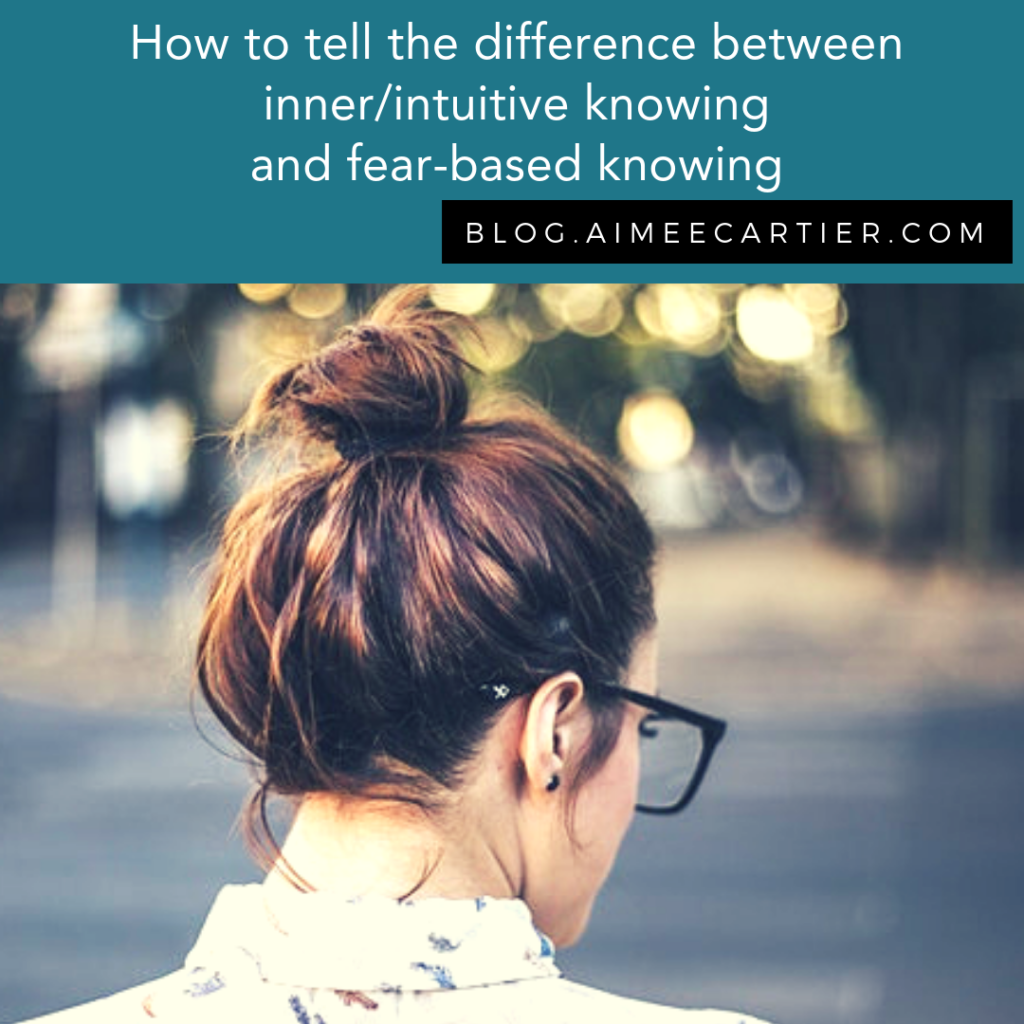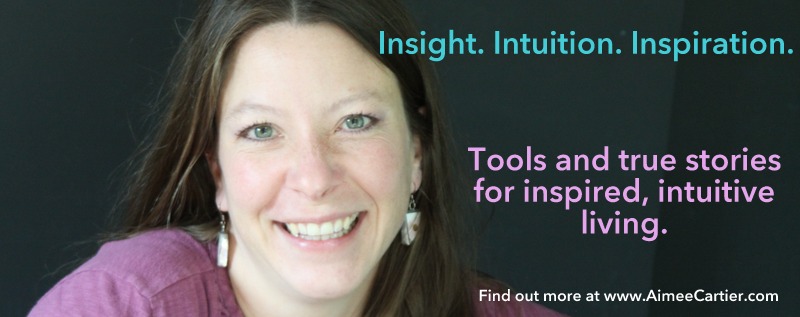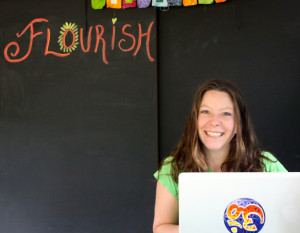How to tell the difference between inner/intuitive knowing and fear-based knowing
Recently one of my Intuition University students asked how to differentiate between inner knowing and fear-based “knowing”?
The answer is easy. Inner knowing/intuitive knowing or your intuition speaks using a calm, certain, unquestionable, but also either peaceful or emotionless tone. Even if what it is telling you is a big deal.
The best example I can give of this happened to one of my students while she was in class with me. During that time her father-in-law became ill. Some time during that process her inner knowing told her that he would die soon. The information came to her—like words in her mind. But they weren’t fraught with the emotion that loosing her father-in-law would eventually cause her. The knowing was neutral and calm. She just knew it.

Now let me be clear– following your inner knowing might lead you to emotion. It could be grief, like my student’s example. It could be elation in great things happening—and, for the record, it could also be fear. (That’s why I have a whole chapter on transforming fear in my book, Getting Answers.) We are often afraid of things that we have not done before—big steps, or even just pivots or new directions often illicit some fear reaction in our brain, “What if it doesn’t turn out all right?” “What if this isn’t the right choice? What if I fail? What if I miss a different opportunity?”… Heard any of these before? 🙂 But when you have the original inner knowing– it doesn’t come with that tone.
The other kind of knowing—fear-based knowing—is not calm or neutral. It never is. Not at the start and not at the finish! It has a frantic edge to it– or some kind of an edge. Mine is frantic—yours may be anxious, or worried.
Let me give you and example. Years ago—when I was writing my book, Getting Answers: Using Your Intuition to Discover Your Best Life I went to a book publishers conference in Oregon. The night before I went I suddenly had this idea that if I wanted to get my book published I had better show up at this conference armed with several copies of my book proposal and be ready to deliver those to people. This idea had a frantic edge to it.
Frantic thoughts are never good advice. And they are never inner or intuitive knowing.
 I lost sleep. I stressed about it all night—making the finishing touches—printing out the 15 copies or whatever it was. I felt a fear that if I didn’t do this I wouldn’t be successful at getting my book published. The decision was driven by this fear. My thoughts had a frantic edge—I was under a (self-imposed) tight deadline (also a frequent sign of my frantic mind), my thoughts were racing, and I had this feeling like “If-I don’t-do-this-and-do-it-RIGHT-NOW-everything-is-going-to-fail.” Those are the signature characteristics of my fearful mind. It always has some or all of those qualities. I can also recognize that is it is a tone that arises in me when I really want something but I have no idea how to get it. Frantic mind to the rescue! NOT! But that doesn’t stop it from thinking it’s the person for the job.
I lost sleep. I stressed about it all night—making the finishing touches—printing out the 15 copies or whatever it was. I felt a fear that if I didn’t do this I wouldn’t be successful at getting my book published. The decision was driven by this fear. My thoughts had a frantic edge—I was under a (self-imposed) tight deadline (also a frequent sign of my frantic mind), my thoughts were racing, and I had this feeling like “If-I don’t-do-this-and-do-it-RIGHT-NOW-everything-is-going-to-fail.” Those are the signature characteristics of my fearful mind. It always has some or all of those qualities. I can also recognize that is it is a tone that arises in me when I really want something but I have no idea how to get it. Frantic mind to the rescue! NOT! But that doesn’t stop it from thinking it’s the person for the job.
Do you know how many of my book proposals I used at that conference?
Yep, zero.
Did I make some good connections at the conference? Yes. Did they involve me getting my book proposal into their hands during THAT weekend and putting to good use the hours of work that I had painstakingly done in the middle of the night at the cost of my sleep? No.
That was when I learned about what I call “frantic mind.” That’s what mine looks like when I am in fear-based “knowing” and not wise inner knowing. For you it could look different. Another student of mine calls hers the “worried or anxious mind.” Whatever yours looks like, let me tell you straight out that when you are making decisions from that place—it IS NOT your intuition talking to you.
It’s your fear based brain parts! Likely your amygdala is engaged. That’s the part of our brain we share with reptiles! The one that can allow you to get out of a situation fast– NOT create an optimal situation.
Your mind will tell you all kinds of things during those moments. None of them are worth listening to.
It never has good ideas.
So here is what I do when my frantic fearful mind is trying to call the shots.
- First, I recognize the tone. If you need help with this you might ask yourself, “How do I feel when I am thinking of these solutions/ideas? What is the state of my mind?” My MO is usually rushed, harried, frantic, and like my mind is running through a rolodex of possible solutions at high speed. Yours might be anxious or afraid. Just notice it.
- I remind myself that my frantic mind has NOT EVEN ONCE IN MY LIFE come up with a solution that was necessary or worthy.
- I understand that it (frantic/fearful brain) is doing its job. It’s not the frantic mind’s fault. It’s doing its best to come up with solutions for something that you are trying to solve—likely something you do not already know how to do—which is waking up the amygdala part of your brain.
- I ignore it. Do not act on frantic mind’s advice. It’s always shite.
- Instead, I change the subject—think about something else. If you need a task– the work to do in those moments is to calm your animal body. (That’s what I call your human body.) Work on calming your body and being— go for a walk outside. Clean the bathroom, vacuum the floor, fold a pile of laundry. Sew a patch on your kid’s jeans—use the time to do something you’ve been putting off or haven’t gotten to for a while. Because the truth is you don’t currently know what to do. And fearful mind isn’t going to give you any good ideas on the subject. So the thing to do right now is nothing—about that challenge you are trying to solve anyway. Relax your brain, body, and being (that’s when the good answers come).
Understanding the difference between intuitive knowing and fearful knowing really isn’t very hard. It involves you paying attention when the information comes in and noticing the tone it arrives on. I advise listening to your inner knowing (obviously!), even if it does bring up fear in you later. I also advise turning away from the fearful/frantic/worried advice! To put it simply, it’s no bueno. In our house that’s Spanish for “no good!” 😉
All my love,
Aimée
Aimée Cartier is a psychic guide, a teacher for those who want to access the power and goodness of a finely tuned intuition and of empaths who want to be able to manage their gift, and the author of Getting Answers: Using Your Intuition to Discover Your Own Life. She endeavors to ignore her own fear-based knowing whenever it rears its sometimes insistent head. She believes that you can too. 🙂 You can find out more about her and her work at www.AimeeCartier.com.






 I like this!
I like this!